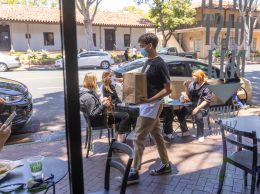Small businesses on the Central Coast are finding ways to adapt to sweeping new coronavirus restrictions, staying connected to customers even as they keep them at arm’s length.
Whether it’s through online orders and curbside pickup or careful limits to the number of customers in a store, business owners are changing the way their products are sold. But without a clear timeline for the closures, planning for the long term remains a challenge.
“There are so many unknowns that we have just decided to take it one day at a time,” said Kathryn Graham, owner of C’est Cheese in downtown Santa Barbara. “If we sit and concentrate on all those unknowns, it can feel too out of control, so we look at what we can do right now to make sure our staff have work tomorrow.”
Applications for emergency financing resources have poured in at organizations like Women’s Economic Ventures and the Small Business Administration.
Smaller businesses “get hit the hardest, because they don’t have cash reserves, generally,” said Nicki Parr, associate director of strategic initiatives for WEV. “They’re operating on smaller margins. Anything they are making is going right back into the business.”
Meanwhile, food and janitorial businesses are seeing higher demand and looking for resources to help them find the necessary supplies.
“They’re looking for advice,” Parr said, including resources for their employees. “We’re trying to help them pivot toward new opportunities that may be there.”
As the first event cancellations started to come in, in mid-March, C’est Cheese tallied up around $12,000 in losses for its catering business, Graham said. But retail sales shot up and orders from customers doubled in size as they prepared to make more of their meals at home.
“Because of what we went through, because of the Thomas fire and resulting mudslides, our customers were very conscious of our situation,” she said.
The company changed its protocols almost daily to put more space between customers, reduce their contact with the products, sanitize all their equipment and use protective gear with each transaction. Finally, it closed its retail store to customers completely, switching to curbside pickup and putting its catering staff to work making home deliveries.
With grocery stores overwhelmed, the company has aimed to reassure customers that the supply chain for its cheese and deli products remains undisrupted, Graham said.
With a high-risk clientele, Scrubs on the Run in Ventura County has seen a steep spike in demand, even as it tries to prioritize safety for its customers and employees.
“We have seen an increase in need, and most of the customers that we’re seeing weren’t our shoppers,” prior to the outbreak, said owner and founder Reyna Chavez.
The company closed its smallest location in Oxnard and consolidated employees at its Ventura and Thousand Oaks sites, doubling up on staff to help customers navigate its stores without touching the products. It set a limit of three customers in the stores at a time and has considered staying open later to offer additional access for health care providers looking for long-sleeved options, jackets with cuffs, lab coats and antimicrobial detergent boosters.
The company has also worked closely with vendors to maintain its stock levels, as well as supplying 300 sets of scrubs to local hospitals.
Employees help customers select the sizes and styles they want to try on and “quarantine” products that aren’t chosen until they can be sanitized, Chavez said. The new business isn’t driving huge profits, she added, but has helped it stay open and provide supplies as hospitals have ramped up hiring efforts.
Though many businesses have made changes in the short term to keep revenue coming in, the widespread closures won’t be viable over the coming three months, said UC Santa Barbara Economic Forecast Project Executive Director Peter Rupert.
The restrictions have impacted jobs for some 46,000 retail and hospitality workers in Santa Barbara County alone, he said, potentially ballooning unemployment 300 percent or more.
As such, a plan to bring businesses back online safely should be a top priority for city and county leaders, Rupert said, including securing supplies of sanitizer and protective equipment for workers, and instituting ways to trace back potential exposure.
“It’s going to overwhelm our social services,” he said, with a high risk for an increase in homelessness. “We’re not prepared for it. Just like trying to flatten the curve of the coronavirus, we need to be thinking about how to flatten the economic curve.”
NONPROFIT RESPONSE
Across the region, nonprofits have stepped up to help small businesses and fill some of the gaps, even as they face many of the same restrictions.
The Ventura County Community Foundation has put out a call for funding to bolster no- or low-interest loan programs for small businesses through WEV and the Economic Development Collaborative, said CEO Vanessa Bechtel.
The organization has partnered with the League of California Community Foundations, Bechtel said, “recognizing that we’re all connected throughout the 101 corridor.” Other top priorities include supporting food banks delivering meals for the housebound, securing protective gear for nonprofits working with vulnerable populations and organizations serving youth that have had to suspend operations.
“Across the board, not only are nonprofit organizations suffering financial volatility with resources that are connected to the market, it’s also disrupting other sources of revenue,” such as income from individual case management or youth memberships that have been temporarily suspended, she said. “It’s a double whammy.”
The crisis also follows on the heels of widespread nonprofit response to deadly natural disasters and a mass shooting.
“After several years of nonprofits really stretching themselves to care for our community, their reserves going into this were more precarious,” she said.
VCCF has worked to refer individuals to specialized services as seniors have grappled with disruptions to their care, working parents lose transportation, food and childcare resources, and other vulnerable populations find themselves forced to stay home in dangerous conditions.
The experience has fostered highly efficient collaboration across charitable organizations, Bechtel said.
“Because of the fact that we’ve gone through such challenging times as a community, the relationships, and the understanding of how the social safety net works, and how we all pitch in, our roles, has never been higher,” she said. “I’m seeing heroic action.”
• Contact Marissa Nall at mnall@pacbiztimes.com.






 Print
Print Email
Email

















